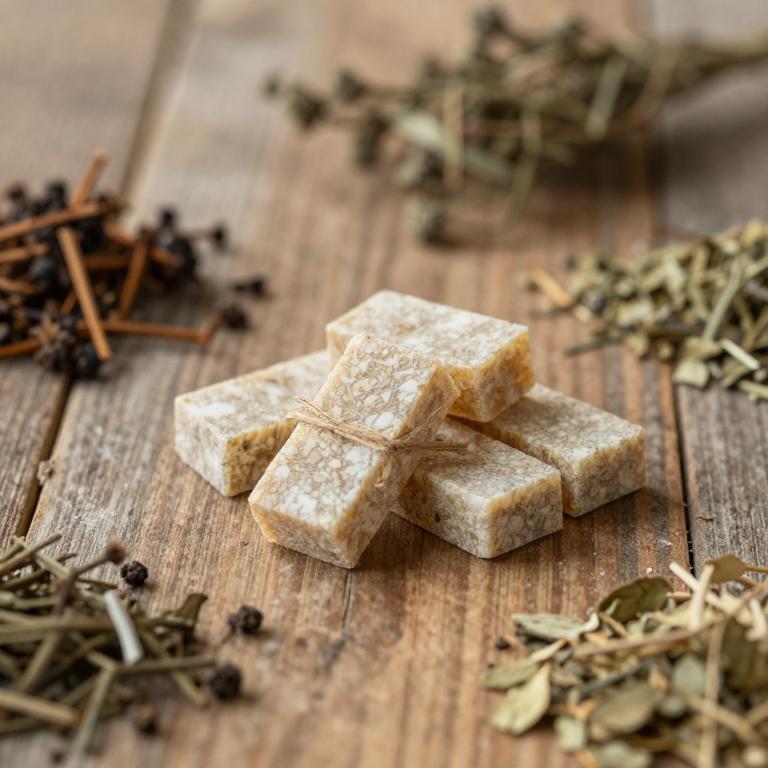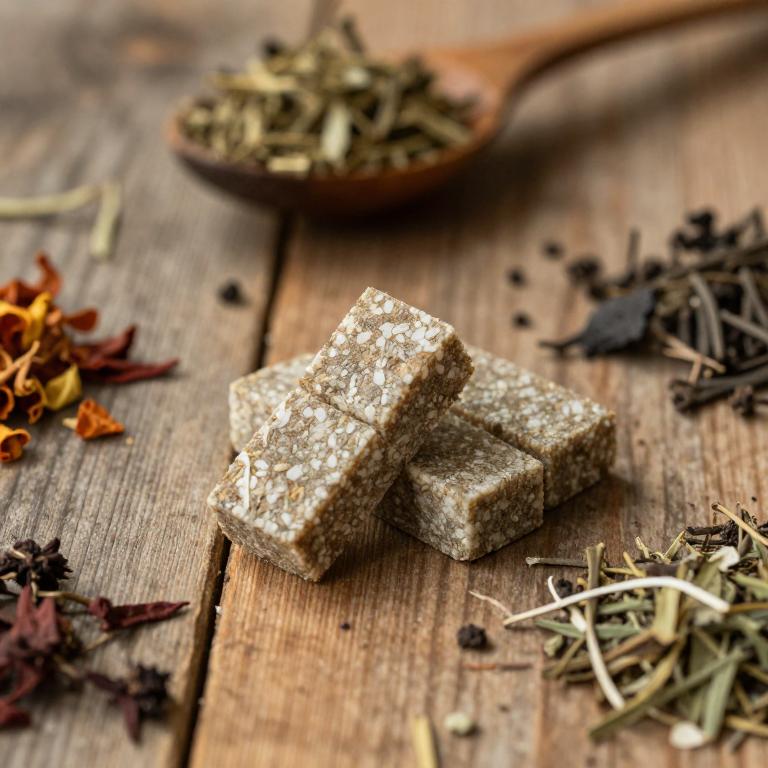10 Best Herbal Lozenges For Upset Stomach

Herbal lozenges can be a natural and soothing remedy for an upset stomach, often containing ingredients like ginger, peppermint, or licorice root, which are known for their digestive and anti-inflammatory properties.
These lozenges work by gently calming the stomach lining and reducing nausea, bloating, or indigestion without the use of harsh chemicals. Unlike traditional over-the-counter medications, herbal lozenges are generally considered safe for most people, including children and those who prefer natural remedies. They are easy to use, convenient for on-the-go relief, and can be found in various flavors to enhance their palatability.
However, it is advisable to consult a healthcare professional if symptoms persist or worsen, as herbal remedies may not address underlying medical conditions.
Table of Contents
- 1. Fennel (Foeniculum vulgare)
- 2. Cumin (Cuminum cyminum)
- 3. Peppermint (Mentha piperita)
- 4. Ginger (Zingiber officinale)
- 5. Licorice (Glycyrrhiza glabra)
- 6. Anise (Pimpinella anisum)
- 7. Rosemary (Rosmarinus officinalis)
- 8. Thistle (Silybum marianum)
- 9. Salvia (Salvia officinalis)
- 10. Thyme (Thymus vulgaris)
1. Fennel (Foeniculum vulgare)

Foeniculum vulgare, commonly known as fennel, is often used in herbal lozenges to help alleviate symptoms of an upset stomach.
These lozenges are formulated with the essential oils and extracts of fennel seeds, which are known for their carminative and antispasmodic properties. Fennel helps to soothe digestive discomfort by reducing gas, bloating, and cramping, making it a popular remedy for mild gastrointestinal issues. The aromatic compounds in fennel also have a calming effect on the digestive tract, promoting easier digestion and comfort.
When taken as directed, fennel herbal lozenges can provide natural relief for those experiencing occasional stomach upset without the use of synthetic medications.
2. Cumin (Cuminum cyminum)

Cuminum cyminum, commonly known as cumin, has been traditionally used in herbal medicine for its digestive benefits.
Cumin seed lozenges are formulated to support digestive health by promoting the secretion of digestive enzymes and reducing bloating. These lozenges may help alleviate symptoms of an upset stomach, such as nausea and indigestion, due to their carminative and anti-inflammatory properties. The natural compounds in cumin, including essential oils and flavonoids, contribute to its soothing effect on the gastrointestinal tract.
When used as part of a holistic approach, cumin cyminum lozenges can be a gentle and effective remedy for mild digestive discomfort.
3. Peppermint (Mentha piperita)

Mentha piperita, commonly known as peppermint, is a popular herbal ingredient used in lozenges to alleviate symptoms of an upset stomach.
These lozenges work by soothing the digestive tract and reducing inflammation, which can help ease discomfort caused by indigestion or gastrointestinal spasms. The cooling effect of peppermint can also help relax the muscles in the stomach and intestines, promoting smoother digestion. Peppermint lozenges are often recommended for people suffering from nausea, bloating, and other mild digestive issues.
As a natural remedy, they offer a gentle and effective alternative to over-the-counter medications for temporary relief of stomach upset.
4. Ginger (Zingiber officinale)

Zingiber officinale, commonly known as ginger, has been widely recognized for its digestive benefits and is often used in herbal lozenges to alleviate symptoms of an upset stomach.
These lozenges provide a convenient and targeted way to deliver ginger's active compounds, such as gingerol and shogaol, which have anti-inflammatory and carminative properties. Ginger is known to help reduce nausea, soothe gastrointestinal discomfort, and promote healthy digestion by stimulating the production of digestive enzymes. The soothing texture of the lozenges also makes them an easy-to-consume option for those experiencing mild digestive upset.
Regular use of zingiber officinale herbal lozenges may offer natural relief for occasional stomach issues without the side effects associated with some over-the-counter medications.
5. Licorice (Glycyrrhiza glabra)

Glycyrrhiza glabra, commonly known as licorice root, has been traditionally used in herbal medicine for its soothing properties.
Glycyrrhiza glabra herbal lozenges are formulated to provide relief from upset stomach by reducing inflammation and irritation in the digestive tract. The active compounds in licorice root, such as glycyrrhizin and flavonoids, help to calm gastrointestinal discomfort and promote healing. These lozenges are often recommended for individuals experiencing heartburn, indigestion, or mild stomach upset.
However, long-term use should be monitored due to potential side effects related to cortisol-like effects in the body.
6. Anise (Pimpinella anisum)

Pimpinella anisum, commonly known as anise, is a traditional herb often used in herbal lozenges to soothe upset stomachs.
These lozenges are valued for their mild licorice-like flavor and their ability to aid digestion by promoting the release of digestive enzymes. Anise is believed to have carminative properties that help reduce gas and bloating, making it beneficial for individuals experiencing digestive discomfort. The herbal lozenges are typically easy to swallow and can be used as a natural alternative to conventional medications.
When used as directed, anise-based lozenges may provide gentle relief from mild gastrointestinal issues without the side effects associated with some pharmaceutical options.
7. Rosemary (Rosmarinus officinalis)

Rosmarinus officinalis, commonly known as rosemary, is a herb often used in herbal lozenges to support digestive health.
These lozenges are formulated to soothe an upset stomach by leveraging rosemary's natural anti-inflammatory and carminative properties. The essential oils in rosemary can help ease bloating and reduce nausea, making them a gentle option for those experiencing mild gastrointestinal discomfort. Regular use of rosemary herbal lozenges may also promote better digestion and relieve symptoms such as indigestion and gas.
While they are generally safe, it is advisable to consult a healthcare professional before use, especially for individuals with chronic digestive conditions.
8. Thistle (Silybum marianum)

Silybum marianum, also known as milk thistle, is a herbal remedy often used in the form of lozenges to support digestive health.
These lozenges are typically made from the seeds of the plant and are believed to help soothe an upset stomach due to their potential anti-inflammatory and antioxidant properties. The active compound, silymarin, is thought to protect the liver and may aid in reducing gastrointestinal irritation. While some people use these lozenges for mild digestive discomfort, they are not a substitute for medical treatment in cases of severe or persistent stomach issues.
It is important to consult a healthcare professional before using silybum marianum, especially if you have underlying health conditions or are taking other medications.
9. Salvia (Salvia officinalis)

Salvia officinalis, commonly known as sage, has been traditionally used for its digestive benefits, and sage herbal lozenges offer a natural remedy for upset stomach symptoms.
These lozenges contain concentrated extracts of the plant, which may help reduce inflammation in the gastrointestinal tract and alleviate nausea. The antimicrobial properties of sage can also support digestion by promoting a healthy balance of gut flora. When used as part of a holistic approach, sage lozenges may provide gentle relief from mild digestive discomfort.
However, it is important to consult with a healthcare professional before using them, especially for prolonged or severe stomach issues.
10. Thyme (Thymus vulgaris)

Thymus vulgaris herbal lozenges, derived from the common thyme plant, are traditionally used to support digestive health and alleviate symptoms of an upset stomach.
These lozenges contain thymol, a potent phytochemical known for its antimicrobial and anti-inflammatory properties, which may help reduce gastrointestinal discomfort. The soothing effects of thyme can help ease nausea, bloating, and mild digestive irritation when used as part of a holistic approach to wellness. While they are generally considered safe for most adults, it is advisable to consult a healthcare professional before use, especially for individuals with known allergies or chronic conditions.
Incorporating thymus vulgaris lozenges into a routine may offer natural relief for occasional stomach upset, complementing other lifestyle and dietary adjustments.